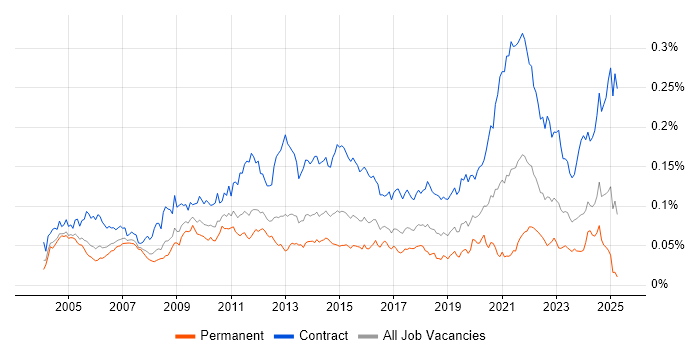Data Modeller
UK
The median Data Modeller salary in the UK is £60,000 per year, according to job vacancies posted during the 6 months leading to 31 May 2025.
The table below provides salary benchmarking and summary statistics, comparing them to the same period in the previous two years.
| 6 months to 31 May 2025 |
Same period 2024 | Same period 2023 | |
|---|---|---|---|
| Rank | 690 | 869 | 917 |
| Rank change year-on-year | +179 | +48 | +217 |
| Permanent jobs requiring a Data Modeller | 12 | 38 | 51 |
| As % of all permanent jobs advertised in the UK | 0.021% | 0.037% | 0.053% |
| As % of the Job Titles category | 0.024% | 0.039% | 0.058% |
| Number of salaries quoted | 6 | 30 | 32 |
| 10th Percentile | £49,500 | £44,362 | £42,750 |
| 25th Percentile | £51,875 | £49,396 | £53,000 |
| Median annual salary (50th Percentile) | £60,000 | £65,000 | £56,750 |
| Median % change year-on-year | -7.69% | +14.54% | -24.33% |
| 75th Percentile | £63,438 | £74,375 | £71,563 |
| 90th Percentile | £75,625 | £88,000 | £72,500 |
| UK excluding London median annual salary | £60,000 | £65,000 | £47,500 |
| % change year-on-year | -7.69% | +36.84% | -26.92% |
All Permanent IT Job Vacancies
UK
For comparison with the information above, the following table provides summary statistics for all permanent IT job vacancies. Most job vacancies include a discernible job title that can be normalized. As such, the figures in the second row provide an indication of the number of permanent jobs in our overall sample.
| Permanent vacancies in the UK with a recognized job title | 50,444 | 98,297 | 87,491 |
| % of permanent jobs with a recognized job title | 90.33% | 94.81% | 91.34% |
| Number of salaries quoted | 26,384 | 69,991 | 55,965 |
| 10th Percentile | £28,750 | £28,500 | £32,500 |
| 25th Percentile | £40,748 | £38,500 | £45,000 |
| Median annual salary (50th Percentile) | £55,000 | £52,500 | £60,000 |
| Median % change year-on-year | +4.76% | -12.50% | - |
| 75th Percentile | £73,750 | £70,000 | £80,000 |
| 90th Percentile | £95,000 | £90,000 | £100,000 |
| UK excluding London median annual salary | £51,000 | £50,000 | £53,500 |
| % change year-on-year | +2.00% | -6.54% | +6.49% |
Data Modeller
Job Vacancy Trend
Job postings that featured Data Modeller in the job title as a proportion of all IT jobs advertised.

Data Modeller
Salary Trend
3-month moving average salary quoted in jobs citing Data Modeller.
Data Modeller
Salary Histogram
Salary distribution for jobs citing Data Modeller over the 6 months to 31 May 2025.
Data Modeller
Top 10 Job Locations
The table below looks at the demand and provides a guide to the median salaries quoted in IT jobs citing Data Modeller within the UK over the 6 months to 31 May 2025. The 'Rank Change' column provides an indication of the change in demand within each location based on the same 6 month period last year.
| Location | Rank Change on Same Period Last Year |
Matching Permanent IT Job Ads |
Median Salary Past 6 Months |
Median Salary % Change on Same Period Last Year |
Live Jobs |
|---|---|---|---|---|---|
| UK excluding London | +164 | 11 | £60,000 | -7.69% | 5 |
| England | +148 | 9 | £60,000 | -7.69% | 14 |
| Midlands | +69 | 5 | £60,000 | -7.69% | 1 |
| West Midlands | +60 | 5 | £60,000 | -7.69% | 1 |
| Scotland | +121 | 3 | - | - | |
| South West | +109 | 3 | - | - | 1 |
| Work from Home | +105 | 2 | - | - | 11 |
| North of England | +34 | 2 | - | - | 1 |
| North West | 0 | 2 | - | - | |
| London | +100 | 1 | £51,000 | -21.54% | 10 |
Data Modeller Skill Set
Top 30 Co-occurring Skills and Capabilities
For the 6 months to 31 May 2025, Data Modeller job roles required the following skills and capabilities in order of popularity. The figures indicate the absolute number co-occurrences and as a proportion of all permanent job ads featuring Data Modeller in the job title.
|
|
Data Modeller Skill Set
Co-occurring Skills and Capabilities by Category
The follow tables expand on the table above by listing co-occurrences grouped by category. The same employment type, locality and period is covered with up to 20 co-occurrences shown in each of the following categories:
